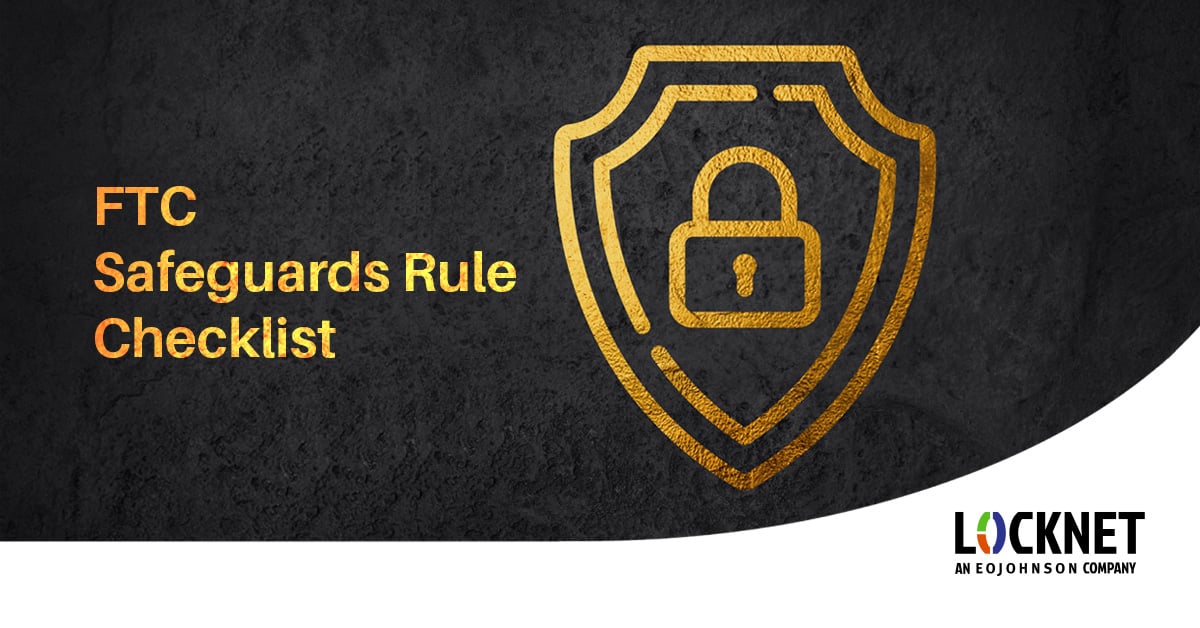Industries We Serve
World Class IT Support & Service
Real People. Right Now.
About Locknet® IT Services
From the first hello, the Locknet® team is dedicated to serving you and your needs.
Real People. Right Now.
From the first hello, the Locknet® team is dedicated to serving you and your needs.


Updated April 21, 2025
Banks and financial institutions face growing pressure to protect sensitive customer data. That pressure isn’t just from customers - it also comes from regulators. One of the most important compliance requirements for financial institutions is the FTC Safeguards Rule, which mandates robust data security measures to protect consumer information.
For community banks and credit unions with limited internal IT resources, understanding and complying with this rule is both a regulatory necessity and a cybersecurity imperative.
The FTC Safeguards Rule, part of the Gramm-Leach-Bliley Act (GLBA), requires financial institutions to implement a written information security program. The program must be tailored to the size and complexity of the organization, the nature of its activities, and the sensitivity of the customer data it handles.
While it was originally broad and flexible, the Rule was significantly updated in 2021 to include more specific technical and administrative requirements. The updated FTC Safeguards Rule ensures institutions take a proactive approach to protecting customer data, especially in the face of rising cyber threats like ransomware, phishing, and data breaches.
The revised Rule now outlines exactly what your security program must include. This is especially relevant for community banks that may not have a dedicated CISO or in-house cybersecurity team. Leaders must now ensure that they are not only securing data but also documenting their efforts, testing their systems, and reporting regularly.
These updates mean that compliance is no longer as simple as having antivirus software and a firewall. It requires a layered, strategic approach involving access controls, encryption, incident response planning, and staff training.
To help your institution stay compliant, here’s a practical FTC Safeguards Rule checklist that is tailored to the needs of midsize banks.
Designate someone (internal or third-party) responsible for overseeing and enforcing your security program. The qualified individual must report in writing regularly (at least annually) to your organization’s Board of Directors or governing body.
Identify foreseeable internal and external risks to customer information and evaluate how well your current safeguards address them.
Build a formal plan with policies and procedures to manage and mitigate the identified risks.
Ensure that only authorized personnel can access customer information based on their roles and responsibilities.
Protect sensitive data with encryption technologies that meet modern standards.
Require additional verification steps when accessing sensitive systems or data.
Provide ongoing security awareness training to help staff identify and respond to threats like phishing or social engineering.
Use continuous monitoring and annual penetration testing to assess the effectiveness of your safeguards.
Plan for the worst. Prepare for data breaches or security incidents with a formal plan that outlines roles, response steps, and communication procedures.
Utilize vendor due diligence and monitoring to ensure they follow appropriate data protection measures.
Review and revise your security program at least once a year, or whenever you experience significant operational changes.
Following this checklist will help ensure your institution stays compliant with the FTC Safeguards Rule and better protects the trust of your customers.
Click Here to Download Locknet's FTC Safeguards Rule Checklist
Failure to comply with the FTC Safeguards Rule could lead to regulatory fines, lawsuits, and serious reputational damage. But the bigger risk may be operational. A single breach can disrupt services, compromise client trust, and trigger financial loss. For community banks, the consequences can be devastating.
By taking the Rule seriously and implementing strong safeguards, you’re not just meeting a regulation - you’re strengthening your business.
For banks with limited IT resources, meeting these expectations often means partnering with a managed security service provider that understands the Rule’s requirements and can implement solutions quickly and cost effectively.
These partnerships can help:
Managed IT services for financial institutions can give midsize banks the expertise they need without the overhead of hiring a full internal IT team. It also ensures documentation and testing protocols are in place when auditors and regulators come calling.
The FTC Safeguards Rule isn’t optional, and it’s not static. It reflects the modern threat landscape and holds financial institutions to a higher standard of accountability. For midsize banks, the best path forward often involves working with a trusted IT partner that understands both compliance and cybersecurity. When done right, safeguarding customer data becomes more than a requirement, it becomes a competitive advantage.
Don't wait to secure your bank's future. Together, we can build a robust security program that keeps your customers' data safe and your bank ahead of the curve.
Managed IT

Onalaska, WI Waterloo, IA Wausau, WI Eau Claire, WI Burnsville, MN
You are now leaving locknetmanagedit.com. Please check the privacy policy of the site you are visiting.